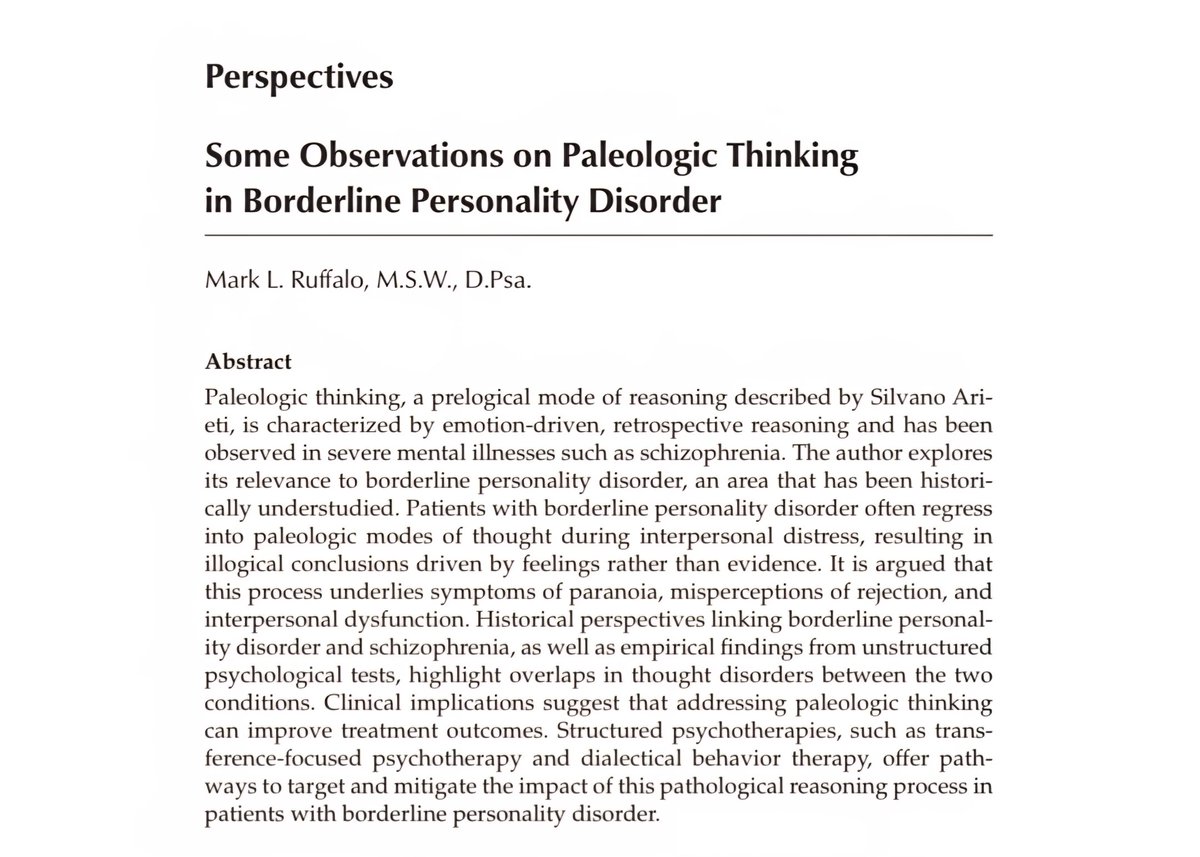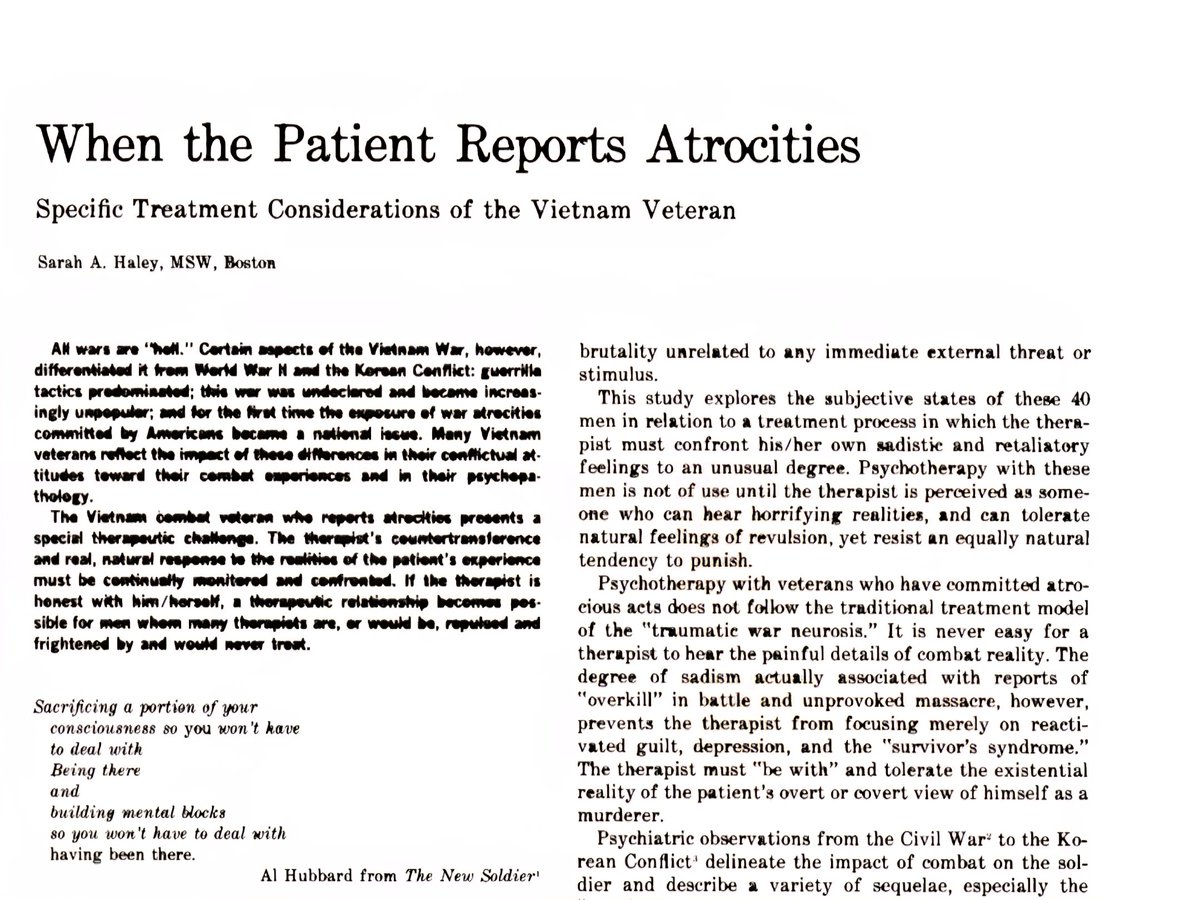
Mark L. Ruffalo
@MarkLRuffalo
Assistant Professor of Psychiatry at @UCFMed and @TuftsMedSchool; clinical and psychiatric social worker; psychoanalysis, history of psychiatry, psychopathology
"It is in the nature of paradox that 'equations' based on it do not work out. Where paradox contaminates human relations, disease appears." - Paul Watzlawick
Our beliefs about prognosis and course of illness often reflect a problem with cross-sectional exposure; during training, we only see a cross-section of patients who do not get better. Evidence shows that even patients with severe illness can show marked improvement over time.
Forthcoming in the journal Psychodynamic Psychiatry. @guilfordpress

"Two things are certain about freedom: that we are never determined and yet that we never change, since, looking back on what we were, we can always find hints of what we have become."--Merleau-Ponty, Cezanne's Doubt.
"A common theme in the literature on the treatment of borderlines is that the therapist must redress the failures, real or fantasied, of primary caretakers. Masterson, Chessick, and Buie and Adler maintain that the syndrome results from mothering (caretaking) that was not 'good…
The beautiful campus of @AustenRiggs in Stockbridge, Massachusetts.

Exactly. In borderline and psychotic states, as Bion and Ogden have shown, mutuality gives way to survival-driven projection. Like a patient insists the analyst is persecutory or invasive communicating unthinkable fear. This isn’t co-creation, it’s evacuation+
Relational psychoanalytic approaches can obscure the fact that certain psychopathologies, especially borderline and psychotic-level organizations, can involve unilateral intrusions into the mental life of the other. In these cases, the other person becomes not a co-constructor…
This 2000 paper by Mary Zanarini of @McLeanHospital reviewed three generations of studies on childhood experiences in borderline personality disorder, concluding that only a multicausal model can account for the complexity of the condition.

Feeling real is more than existing; it is finding a way to exist as oneself... and to have a self into which to retreat for relaxation. -- D. W. Winnicott
In honor of Minority Mental Health Month, learn more about a trailblazing psychiatrist who brought mental health care to marginalized communities. ow.ly/pbZy50WkFL4
“Perhaps most analysts have the humility to admit that they are not able to be of help to every patient they accept for analysis. What is more difficult to admit is that there are times when we, as analysts, are unable to survive destruction in an analysis we are conducting,…”
In this new piece at @PsychToday, I offer some ideas for the future of DSM. In short, psychiatric diagnoses must become truer, fewer, and deeper. psychologytoday.com/us/blog/from-f…

Hannah Decker (2013) on the refusal of psychoanalysts to take seriously matters of psychiatric nosology: "The analysts bring to mind the men who refused to look through Galileo's telescope because they were sure they knew the true heavens and did not want challenges and upsets."
A nice corrective for anyone naively saying psychoanalytic is categorically unscientific. The real question going forward is how to investigate psychoanalytic claims scientifically MORE going forward.
Interested in clinical research on psychoanalysis? Does psychoanalytic therapy work (hint yes)? Here's a fantastic biblio from the Neuropsychoanalysis Association @Mark_Solms @neuroPSA npsa-association.org/education-trai… #psychoanalysis #neuropsychoanalysis #psychotherapy
I am very pleased to introduce the Special Report on Psychotherapy at @PsychTimes, which is now available online. psychiatrictimes.com/view/toward-a-…
This landmark 1974 paper by Sarah Haley, M.S.W., of the Boston VA Hospital, published in the Archives of General Psychiatry, helped establish posttraumatic stress disorder as a diagnosis in DSM-III.

The empathic understanding of the experience of other human beings is as basic an endowment of man as his vision, hearing, touch, taste and smell — Heinz Kohut
“As with every other defense, it is the context and consequences of its use in adulthood that determine whether is is reasonable to be regarded (by self and others) as a positive adaptation, an unremarkable habit, or a pathological affliction” —Nancy McWilliams
I will be presenting "Heads I Win, Tails You Lose: Borderline Personality Disorder as a Disorder of Paradox" at the biennial conference of the American Association for Psychoanalysis in Clinical Social Work in Austin, Texas, November 6-9, 2025. Description: For decades, various…

Many people are caught in a knot of self-destructive behavior and are unable to see it or appreciate how they themselves have tied it. Each believes the problems lie somewhere “out there,” surrounding them but beyond them, rooted in external circumstances. James F. Masterson